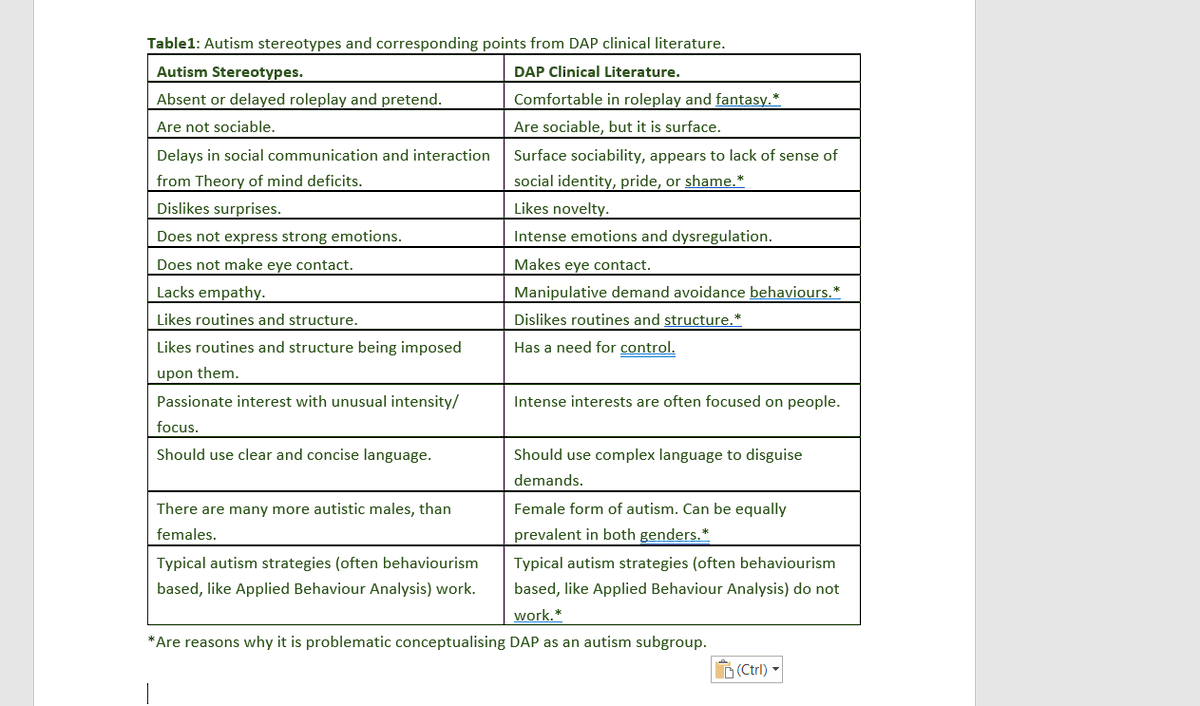
A quick thread on reasons why PDA is controversial.
I would appreciate feedback on this, and it is in no particular order.
I would appreciate feedback on this, and it is in no particular order.
•The “pathological” descriptor is demeaning and horrible.
•PDA lacks consensus on what it is.
•There is no standardised diagnostic profile or validated tools.
•PDA lacks consensus on what it is.
•There is no standardised diagnostic profile or validated tools.
•PDA is not in either main diagnostic manuals.
•PDA risks undermining validity of clinical based language, as it involves an atypical approach to nosology.
•PDA risks undermining validity of clinical based language, as it involves an atypical approach to nosology.
•Ignoring non-autistic persons with PDA and how clinical justifications for PDA are applicable to them.
•Prematurely forming a community of practice around outlook “PDA is an ASD”; generally missing/ ignoring valid critique of PDA.
•Prematurely forming a community of practice around outlook “PDA is an ASD”; generally missing/ ignoring valid critique of PDA.
•PDA pathologises traits from accepted conditions and thus cannot be a Disorder. Personally, this should only matter to prevent PDA being accepted as something, it is more than e.g., A + B + C ≠ A.
•Some features of PDA are hard to reliably measure.
•Some features of PDA are hard to reliably measure.
•Lack of cogent accounts and descriptions of PDA, e.g., missing/ ignoring non-autistic persons in research samples and still calling PDA an “autism profile”. Or deficits in “Pride/ Shame/ Social identity” causing panic attacks...
... These deficits are meant to allow a person to be highly motivated to avoid demands of “ordinary life” (non-autistic life), however now arguing demand avoidance is compulsive in nature (i.e, not by choice).
•PDA is viewed as an ASD and is trying to divide autism despite many autistic persons not wanting autism to be subdivided.
•PDA seems to pathologise a person’s self-agency and risks undermining a person’s human rights.
•PDA seems to pathologise a person’s self-agency and risks undermining a person’s human rights.
•Poor quality of much of PDA research, circular in nature, with generic features, or relying on snowball sampling or caregiver reports.
•Signs of many vulnerable persons are supporting “PDA is an ASD” narrative.
•Signs of many vulnerable persons are supporting “PDA is an ASD” narrative.
•Lack of disclosure of Conflict of Interests.
•PDA is a culturally based construct, to the UK
•PDA is a culturally based construct, to the UK
•Viewing PDA as an ASD and arguing some autistic persons should be protected from reinforcement-based approaches like ABA/ PBS, while leaving the rest of autistic population to potentially be exposed to ABA/ PBS.
•PDA is a culturally based construct, to the UK
•PDA is potentially highly stigmatising and is potentially problematic for autistic persons to escape stigma of autism, as PDA stereotypes are opposite of autism.
•PDA is potentially highly stigmatising and is potentially problematic for autistic persons to escape stigma of autism, as PDA stereotypes are opposite of autism.
•PDA can adversely impact a person’s life chances, e.g. who would wish to employ someone who has a “pathological”/ “extreme” aversion to demands?
•PDA strategies replicate good practice and comparable strategies are widely practiced;
•PDA strategies replicate good practice and comparable strategies are widely practiced;
@Allison66746425 @milton_damian @IgHawthorne @AutZebra @Neurodiversit19
Please can you see the above list of potential reasons why PDA is controversial. Is there anything you think should be taken out? Or anything that should be included?
Please can you see the above list of potential reasons why PDA is controversial. Is there anything you think should be taken out? Or anything that should be included?
@threadreaderapp Please could you unroll?
Thank you in advance.
Thank you in advance.
@PDASociety @Autism
Representatives of your organisations/ or "clinicians" who consult on "PDA is an ASD" can respond privately to the above list of potential controversies of PDA. Please respond by Monday 31/05/2021.
Representatives of your organisations/ or "clinicians" who consult on "PDA is an ASD" can respond privately to the above list of potential controversies of PDA. Please respond by Monday 31/05/2021.
@PDASociety @Autism I doubt that either organisation would publicly respond to this list, but I am willing to hear out a defense on particular point.
• • •
Missing some Tweet in this thread? You can try to
force a refresh












